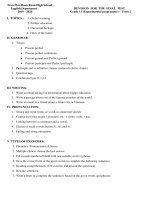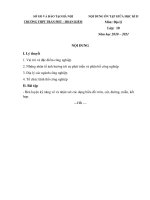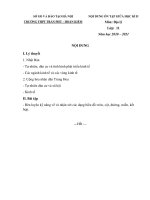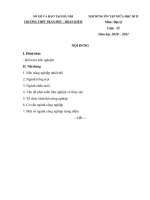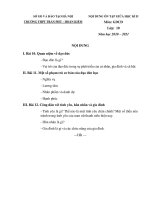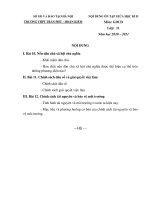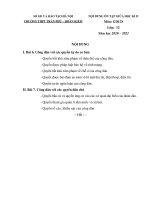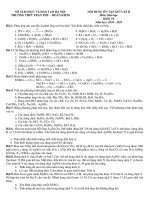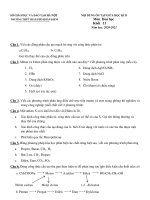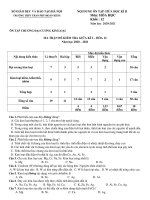Đề cương ôn tập học kì 2 môn Tiếng Anh lớp 11 năm 2019-2020 - Trường THPT Trần Phú
Bạn đang xem bản rút gọn của tài liệu. Xem và tải ngay bản đầy đủ của tài liệu tại đây (217.39 KB, 8 trang )
Tran Phu-Hoan Kiem High School
English Department
2019 - 2020
I. TOPICS :
REVISION FOR THE FINAL TEST
Grade 11 (Experimental programme) – Term 2
1. Global warming
2. Further education
3. Our world heritage
4. Cities of the future
II. GRAMMAR
1. Tenses:
•
Present perfect
•
Present perfect continuous
•
Present gerund and Perfect gerund
•
Present participle and Perfect participle
2. Participle and to infinitive clauses (reduced relative clause)
3. Question tags
4. Conditional type 0, 1,2,3
III. WRITING:
1. Write an email asking for information about higher education.
2. Write a passage about one of the famous wonders of the world.
3. Write an email to a friend about a future city in Vietnam.
IV. PRONUNCIATION:
1. Strong and weak forms of words in connected speech.
2. Contracted forms nouns / pronouns, etc. + verbs; verbs + not.
3. Linking between a consonant and a vowel.
4. Elision of weak vowels before /l/, /n/, and /r/.
5. Falling and rising intonation.
V. TYPES OF EXERCISES:
1. Phonetics: Pronunciation & Stress.
2. Multiple choice/ choose the best answer.
3. Fill in each numbered blank with one suitable word or phrase.
4. Give the correct form of the given words to complete the following sentences
5. Reading comprehension. (T/F exercise and answer the questions)
6. Rewrite sentences.
7. Write a letter or complete the sentences based on the given words and phrases.
PRACTICE EXERCISES
A. PHONETICS
I. Choose the word in each group that has the underlined part pronounced differently from the rest.
1.
A. guitarist
B. fare
C. narrative
D. careful
2.
A. complain
B. won
C. condition
D. profession
3.
A. bench
B. attend
C. educate
D. subject
4.
A. romantic
B. mature
C. mathematics
D. humanity
5.
A. shyness
B. reply
C. multiply
D. syllable
6.
A. desks
B. rulers
C. bags
D. pens
7.
A. minute
B. muddy
C. funny
D. number
8.
A. born
B. world
C. fork
D. short
9.
A. died
B. continued
C. contented
D. followed
10.
A. invited
B. decided
C. wanted
D. watched.
11.
A. routine
B. literature
C. decisive
D. fifty
12.
A. peasant
B. appeal
C. reason
D. teapot
13.
A. exactly
B. immediate
C. pretty
D. become
14.
A. field
B. ready
C. three
D. people
15.
A. typical
B. family
C. bicycle
D. cycling
16.
A. disaster
B. fast
C. satisfy
D. pasture
17.
A. honest
B. honey
C. harvest
D. harder
18.
A. comfort
B. cousin
C. suffer
D. studious
19.
A. says
B. said
C. saint
D. salad
20.
A. breathe
B. breakfast
C. already
D. dreamt
II. Choose the word whose main stress is placed differently from the others.
1.
2.
3.
4.
5.
6.
7.
8.
9.
10.
11.
12.
13.
14.
15.
16.
17.
18.
19.
20.
A. missionary
A. controller
A. genetic
A. atmosphere
A. confirm
A. recession
A. inflation
A. creation
A. throughout
A. maintenance
A. accept
A. undisturbed
A. release
A. transform
A. environment
A. convey
A. communicate
A. infection
A. unsinkable
A. approach
B. various
B. average
B. arbitrary
B. ancient
B. monetary
B. excess
B. successful
B. inspiration
B. appeal
B. significant
B. interaction
B. another
B. retirement
B. exhilarate
B. attention
B. describe
B. infect
B. disaster
B. effective
B. involve
C. technology
C. extensive
C. division
C. powerful
C. policy
C. demand
C. cartoon
C. intervene
C. resourceful
C. executive
C. advancement
C. pessimistic
C. appear
C. precaution
C. adaptable
C. approval
C. descendent
C. public
C. disease
C. expose
D. calculate
D. magnetic
D. volcano
D. appoint
D. proverb
D. regular
D. purpose
D. opportunity
D. maximum
D. reluctant
D. untamed
D. epidemic
D. implement
D. rigorous
D. auditory
D. testimony
D. regulate
D. surround
D. positive
D. garbage
B.GRAMMAR & VOCABULARY
I. Choose the best answer A, B, C or D to complete the sentences.
1. The guest on our show is the youngest golfer ____ the Open.
A. won
B. to win
C. being won
D. winning
2. I have a message for people ____ by the traffic chaos.
A. to delay
B. who delaying
C. delayed
D. who delay
3. The __ items in Con Moong Cave are now kept in Thanh Hoa Museum for preservation and displaying work.
A. excavating
B. excavated
C. excavation
D. excavator
4. The Citadel of the Ho Dynasty is the only stone citadel in Southeast Asia ____ of large limestone blocks.
A. constructing B. which constructed
C. to construct
D. to be constructed
5. Emma Thompson is the most famous actress ____ on the stage here.
A. appeared
B. appear
C. appearing
D. to appear
6. Have you visited the pagodas ____ on Tran Phu Street in Hoi An.
A. to lie
B. lying
C. lain
D. lie
7. The Temple of Preah Vihear in Cambodia is composed of a series of sanctuaries ____ by a system of
pavements and starcases over an 800 metre long axis.
A. linked
B. linking
C. to link
D. being linked
8. Cat Ba is also rich of cultural festivals and traditions that are highly potential for ____ and development.
A. research
B. growth
C. conservation
D. promotion
9. Irresponsible tourists damaged the archaeological site and some of the relics _ back to the last ruling dynasty.
A. to date
B. dating
C. to be dated
D. date
10. The ancient houses ____ by the fire are now under reconstruction.
A. to destroy
B. destroying
C. destroyed
D. destroy
11. The boy ____ in the accident was taken to hospital.
A. injuring
B. being injured
C. have injured
D. injured
12. Hoi An Ancient Town is preserved in a remarkably ____ state.
A. damaged
B. unspoiled
C. intact
D. unharmed
13. Son Doong Cave, ____ in 2009, is believed to contain the world's largest cave passage.
A. first explored B. to explore first
C. exploring first
D. was first explored
14. The captain was the last ____ the sinking ship.
A. to leave
B. that leaving
C. left
D. whom to leave
15. Son Doong Cave is the largest cave in the world ____ in Phong Nha - Ke Bang National Park.
A. which discovered
B. discovering
C. to discover
D. to be discovered
16. The Thang Long Imperial Citadel was built in the 11th century by the Ly Dynasty, ____ the independence
of Dai Viet.
A. marking
B. offering
C. commemorating D. bringing
17. Melanie was the only person ____ a letter of thanks.
A. wrote
B. written
C. to write
D. writing
18. No fluorescent lights, no motorcycles, no television, on the 15th day of each lunar month, the riverside town
of Hoi An ____ modern life the night off.
A. gives
B. lets
C. brings
D. turns
19. We came to the temple dedicated to King Dinh Tien Hoang, ____ Hoa Lu to build the citadel.
A. to choose
B. choosing
C. chosen
D. which chose
20. Who were those people ____ outside?
A. waited
B. to wait
C. who waiting
D. waiting
II. Use the word given in capitals at the end of each line to form the word that fits in the gap in the same line.
1. Can you explain what types of ________________ are available for international students? (FUND)
2. Are _________________________ students allowed to work part-time? (NATIONAL)
3. I'd like to consult you about the ______________ differences that I should be aware of. (CULTURE)
4. What _________ me most is the high cost of living in London as an international student. (WORRY)
5. One of the reasons for Vietnamese students' studying abroad is the quality of the _______________
programmes in higher education. (ACADEMY)
6. Most of these students are interested in pursuing ____ studies for bachelor's degrees. (GRADUATE)
7. Some students decide to study in the United States or the United Kingdom to improve their language
_________________________, which can help them to get a better job. SKILLFUL
8. Some universities in the United States offer different ________________ to international students
to help to cover tuition fees and living costs. (SCHOOL)
9. The higher education _______________ gained at UK universities and colleges are recognised
worldwide. (QUALIFY)
10. Universities must better prepare students for their ________________ careers. (PROFESSION)
11. Cuc Phuong National Park is also a(n) _____________________ zone of fauna. (ABUNDANCE)
12. A number of caves in Huong Son Complex are ________________________ sites belonging to the Hoa
Binh Culture dated back to over 10,000 years. (ARCHAEOLOGY)
13. Set in a quiet environment, Hoi An is _______________________ by peaceful villages that have crafts such
as carpentry, bronze making, and ceramic. (SURROUNDING)
14. Phong Nha - Ke Bang National Park is one of the finest and most _______________________ examples of
a complex limestone landform in Southeast Asia. (DISTINCT)
15. The ___________ work in Con Moong Cave area has been carried out for several years. (EXCAVATE)
16. Phong Nha - Ke Bang National Park can be compared to a huge ____________ museum. (GEOLOGY)
17. The rapid growth of the population has caused daunting problems for city planners, such as
_______________________ roads. (CROWDED)
18. Students return in September for the start of the new_________ year. (ACADEMY)
19. New York City is expected to increase its _____________ energy capacity by 50% by 2050. (RENEW)
20. Our communities will be ________ and more sustainable, so our quality of life will be better. (CLEAN)
21. The government is making plans to ____________________ sensors and cameras in the city centre to
detect traffic problems and help drivers to avoid traffic jams. (INSTALLMENT)
22. We can improve the quality of life of the inhabitants by ________________ pollution. (REDUCE)
23. City dwellers can enjoy better health care than people living in the _______________________, but they
are usually busier and more stressed because of the city's fast pace of life. (COUNTRY)
24. They are building a new waste ________________________ plant to treat wastewater before it is reused or
discharged into rivers. (PROCESS)
25. He filled in an _________ form for the position of clerk. (APPLY)
26. He has $10,000 life_________, which his wife will receive if he dies first. (INSURE)
27. You have no other_________ but to leave now. (CHOOSE)
28. Daisy has fulfilled all the_________ for graduation. (REQUIRE)
29. If I could choose, my_________ is for beef rather than lamb. (PREFER)
30. He had been educated in England which accounted for his _____ in the English language. (PROFICIENT)
III. Fill each gap in the sentence with one word from the box
certificated, tertiary, level, admission, agency, vacant, candidates, maximum, record, original
1.
There are three __________________ for the president of the club.
2.
This is only a reproduction; the __________________ of this painting is in Rome.
3.
His work is not up to a professional __________________ to our disappointment.
4.
Listen to the speaker and __________________ what he says.
5.
Ann went to university for__________________ study after she graduated from high school.
6.
His good character is adequately__________________
7.
Drivers must not exceed a __________________ of 55 miles an hour.
8.
It is not easy to find a__________________ room in the city hotels during the festival.
9.
His__________________ into the hospital was delayed for lack of beds.
10. The employment______________ helps workers to get jobs and find workers for people who need them.
IV. Use a word from the box to fit each gap
marks, work, careers, problem, ambition, lessons, university, jobs, school, medicine
I'm not sure what I'm going to do with myself when I leave (1)______________. Next week, our class
are having a meeting with the school (2)______________ officer who they say is going to tell us all about the
different (3)_______ available. We'll also be able to ask to ask questions. I'm thinking of taking up evening
class to improve my (4) ______________ in maths because my dream is to become a doctor.
Although my parents don't disagree with my (5) ______________, they are doubt whether I am going to
get good enough marks to get into university to do (6) ______________. But they don't want to discourage me
so I think they'll agree to the extra (7) ______________. By the time I finish school, I will have formed a much
better idea of what I'd like to do, but the (8) ______________ is that we are going to have to decide which
subjects to study for (9) ______________ two years before we finish school. Anyway, whatever happens, I'm
going to have to get down to some hard (10) ______________ if I want to achieve my aims.
V. Complete the following sentences with suitable tags.
1. You have never been to Brazil,................................?
2. You don’t like sausages,................................?
3. He is coming to the match tomorrow, ..............................................?
4. Helen phoned you yesterday, ................................?
5. Jack has done his homework, ............................................................?
6. Robert and Sue can skate,.............................................?
7. Julie has got a brother, ..............................?
8. We’ve got a test tomorrow, .................?.
9. I don’t understand this sentence, ...............................?
.
10. Fiona phoned me last night, ..............................................?
11. I don’t like ice-cream,..............................?
12. There’s a policeman at the door,..............................................?
13. Tom is leaving tomorrow,.............................................................?
14. Lisa has just had a baby,.............................................................?
15. I haven’t eaten Chinese food,...............................................?
16. There aren’t any shops or restaurants in this street , ............................................................?
17. I think nobody likes to live in a polluted city, ............................................................?
18. Let’s start our discussion on global warming, ............................................................?
19. Something needs to be done immediately to solve the water shortage problem, .............................................?
20. Stop playing this computer game and do your homework, ............................................................?
C. READING
I. Read the passage and do the tasks that follow.
The Easter Island Statues
When the first sailing ship came to Easter Island in 1722, the captain and crew were afraid to land.
They saw giants looking down at them from the high cliffs. The giants didn't move, so the ship gradually
sailed closer. Finally, the sailors realized the giants were only statues. These huge carvings have puzzled
the world ever since. Who made them? How did they get there?
Easter Island is a small dot in the South Pacific Ocean. It is hundreds of miles away from the
nearest shipping route, and it is one of the most isolated places on earth. The nearest mainland is over
2,000 miles away in South America.
The biggest statue on Easter Island is over 60 feet high and weighs over 100 tons. There are
hundreds of smaller ones, about 15 feet high. All of the statues are carved from stone and some wear
stone hats. Their faces are solemn and unsmiling.
Earlier inhabitants of Easter Island carved the statues from the rocks in a volcanic crater. Next, they had
to move the statues a long distance, in some cases more than ten miles, to erect them in their present
position.
No one knows for certain how the inhabitants achieved this very difficult feat. Some scientists say
that palm trees grew on Easter Island in the past. They think the inhabitants cut the trees down and
placed the heavy statues on the tree trucks. Then groups of seventy or more people rolled the statues to
their present locations. Other scientists dispute this theory because there are no palm trees on the island
today. More importantly, the actual purpose of the statues remains a mystery. Some, at least, were
probably placed on the cliffs to prevent strangers from landing on the island.
The result, however, has been the opposite. Crowds of eager people come to gape at the statues. Easter
Island is no longer a dot on the map. It has a modern aIrport and tourists visit from all over the world.
Task 1: Write T (True) or F (False) to the following sentences.
1. The first ship to arrive at Easter Island was a steam ship.
2. The sailors were afraid to land because they thought there were giants on the island
3.Sailing closer, the sailors realized that the giants were only statues.
4. Easter Island is very close to the mainland of South America.
5. Easter Island lies in the North Pacific Ocean.
6. There are many huge stone statues on the island.
7. The statues have smiling faces.
8. The present inhabitants of Easter Island carved the ,statues
9. There are no theories as to how the statues were placed in their present positions.
10. The statues were placed on the cliff to welcome tourists
Task 2: Answer the questions.
1. Is Easter Island large or small ?
2. Which ocean is it in ?
3. How far away is the nearest mainland?
4. What are the statues of Easter Island made from?
5. How tall is the biggest statue?
6. How much does it weigh?
7. Can you describe the faces of the statues?
8. Where were the rocks for the statues found?
9. How far were some of the statues moved?
10. Did the present inhabitants of Easter Island carve the statues?
II. Read the passage and do the tasks that follow:
Students working for their first degree at a university are called undergraduates. When they take
their degree we say that they graduate, and then they are called graduates. If they continue studying at
university after they have graduated, they are called post-graduates.
Full-time university students spend all their time studying. They have no other employment. Their course
usually lasts for three or four years. Medical students have to follow a course lasting for six or seven
years. Then they graduate as doctors. In Britain, full-time university students have three terms of about
ten weeks in each year. During these terms they go to lectures or they study by themselves. Many
students become members of academic societies and sports clubs and take part in their activities.
Between the university terms they have vacations (or holiday periods). Their vacations are long, but
of course they can use them to study at home.
Some universities, like Oxford and Cambridge in England, are residential. This means that during the
university terms the students live in a university college or hostel or in lodgings chosen from an official
list. The university and college buildings are often very old, and amongst them are fine examples of
ancient architecture.
Other universities are non-residential. Some of the students at these universities can live in a
university hostel, but many live at home or in lodgings and have to travel daily to their lectures. Large
cities often have universities of this kind. Sometimes the students have to spend quite a lot of time on
their journeys, so they cannot join student activities as easily as students in residential universities can.
Full-time students are also called internal students, because they spend all their time at university. There
are also external students who cannot attend the university full-time but who are studying for its
examinations. They are part-time students. They have to do other work during the day, usually to earn
their living, and they study in the evening.
Task 1. Find words in the passage to complete these sentences.
1. A university student is called an ........................................when he first enters the university.
2. If he passes all his examinations, the student gets a...............................................
3. A........... .........................................student spends all his time studying at the university.
4. A...........................................student does not spend all his time studying at the university.
5. University holidays are also known as........................................
Task 2. Decide if these sentences are true (T) or false (F)
T
F
1. All students stay at university for three or four years.
2. Residential students are external students.
3. Some students live in university colleges or hostels.
4. Students spend all their vacation attending lectures.
5. All students in large cities are residential students.
6. Internal students are also called full-time students.
D. WRITING
I. Change the adjective clauses to adjective phrases:
1. Do you know the woman who is coming towards us?
2. I come from a city that is located in the southern part of the country.
3. The children who attend that school receive a good education.
4. The fence which surrounds our house is made of wood.
5. Be sure to follow the instructions that are given at the top of the page.
6. They live in the house that was built in 1980.
7. The papers that are on the table belong to Patricia.
8. The man who talked to the policeman is my uncle.
9. I don’t like him playing in the street. I wish we had a garden that he could play in.
10. He simply loves parities. He is always the first who comes and the last who leaves.
11. The number of students who have been counted is quite high.
12. George is the man who was chosen to represent the committee at the convention.
13. The first man who was interviewed was entirely unsuitable.
14. I have got a bottle of wine but I haven’t got anything that I could open it with.
15. The people who are waiting for the bus in the rain are getting wet.
II. Write a conditional sentence with If ... for each situation
1. We don't visit you very often because you live so far away.
2. That book is too expensive, so I'm not going to buy it.
3. I have to work late tomorrow, so I can't meet you for dinner.
4. They asked him to leave the dining-room because he wasn't wearing a shirt.
5. I wasn't hungry, so I didn't eat anything.
6. The accident happened because the driver in front stopped so suddenly.
7. I didn't know that Matt had to get up early, so I didn't wake him up.
8. I was able to buy the car only because Jim lent me the money.
9. Michelle wasn't injured in the accident because she was wearing a seat belt.
10. She is very shy; that's why she doesn't enjoy parties.
III. Change the following sentences to Indirect speech.
1. Tom said to me "If I have spare time, I will go fishing with you".
2. The teacher told us “If it doesn't rain tomorrow, we can go for a picnic."
3. "Unless you study harder, you will fail the exam" said his parents.
4. "If she goes to the party, she will have a lot of fun." said Peter.
5. "If you need help, I will be willing to help you with the difficult exercises" my sister said.
6. Linda said "I would have come to the party if I hadn't been so busy last week."
7. Tom told me "If I were you, I would look for another job."
8. My friend said to me "What would you do if someone gave you a million pounds?"
9. The gardener said "If I didn't water these plants yesterday, they could die."
10. The doctor said to the patient "You won't feel better unless you takes these medicine."
IV. Change the following sentences to Indirect speech.
1. "I'll take you to the zoo tomorrow" my mother said to me.
2. Jane said to Bill "When do you expect to finish your assignment?"
3. The woman said to the boy "Can you show me the way to the bank?"
4. The man asked the postman "Are there any letters for me today”
5. Henry said to the librarian "How many books can I borrow at a time"
6. John asked his friend "How did you manage to know my telephone number? “
7. Rose said "I was just leaving for the office"
8. Ann asked her brother "What are you planning to do tomorrow?"
9. She asked her boyfriend "Is it true that your father fought in the last war?"
10. He said "I don't understand why she has refused to join us on the trip"
E. WRITING: COMPLETE THE FOLLOWING SENTENCES USING THE WORDS/PHRASES
GIVEN IN THE CORRECT FORMS. You can add more necessary words.
I. Write an email asking for information about higher education, using the following suggestions.
1. I / write / ask you / some information / piece/ advice / further education.
2. I would like / know if I /eligible /apply / university programme.
3. If I pursue/ educate/ immediate, what kind / attendance mode/I choose?.
4. What/ worry /me/ most / high cost /living /London /international student.
5. Can you /explain what /type/ funding /available / international students?.
6. I would like /consult you/ cultural differences/ I should /aware /.
II. Write a passage about Machu Picchu, one of the famous wonders of the world, using the following
suggestions.
1. I / so excited /when / I / receive/ letter yesterday.
2. It / great that you /plan / visit one /world heritage site/ next month
3. Machu Piechu / ancient city / Peru
4. Construction / start / 1450
5. The city / 2,400 meters / above sea level
6. It cover / 13 square kilometers
7. the city / buried / jungle/ not discovered / until 1911
8. Today / Machu Picchu / famous tourist attractions / South America
III. Write complete sentences about Da Lat City, using the words or phrases below. Make changes in
the word form, if necessary.
1. Thanks / its ideal climate and European architecture, Da Lat / well-known / national and international
tourist destination.
2. In an effort /attract more tourists, Da Lat /destroy / natural beauty / environment.
3. general plan / develop / Da Lat city /approved by / Prime Minister.
4. By 2030, Da Lat and the surrounding areas /be /large /than Ha Noi, with /estimated population / about
750,000 inhabitants.
5. project /aims to improve / living conditions / local inhabitants / while preserving /urban space
/architectural works.
6. Environmental problems/ such as fresh water shortages / waste collection / water pollution,
/deforestation /be solved.
7. “miraculous village” project/ turn Dalat / hi-tech agricultural center.
8. The aim / project / to promote / production / clean vegetables / high quality flowers / for both the local
and export markets.
